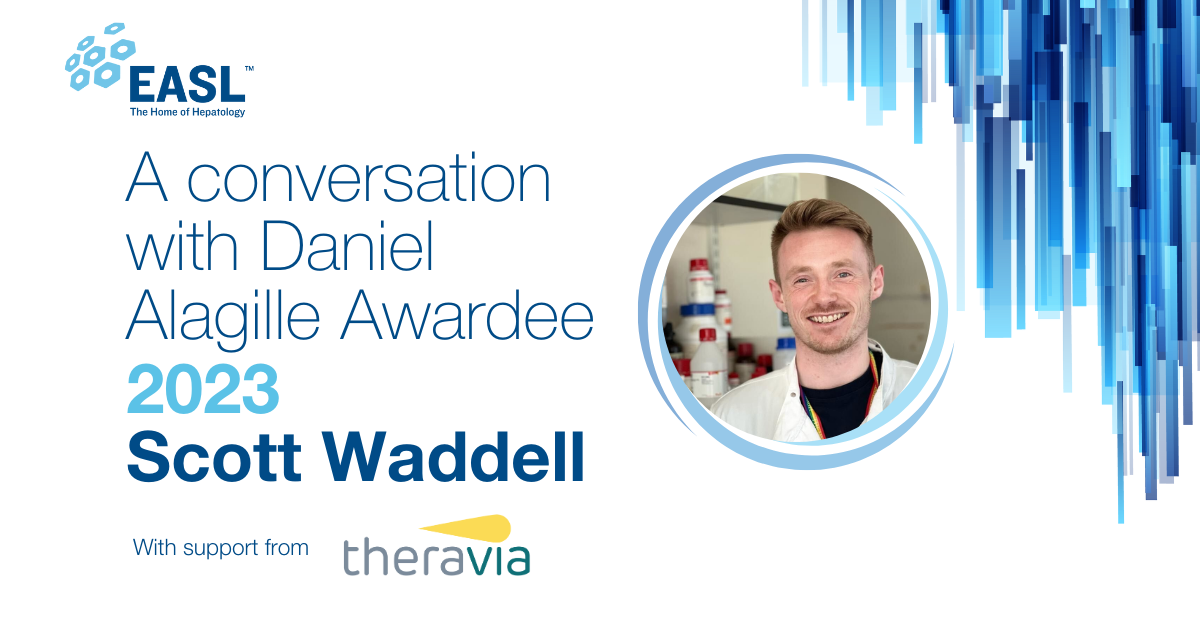Interview with Scott Waddell, 2023 Daniel Alagille Awardee

In an insightful conversation with EASL, Scott Waddell, the recipient of the 2023 Daniel Alagille Award, shares his journey into the field of hepatology. From his initial focus on cholangiocarcinoma to his pioneering work on polycystic liver disease, Waddell’s dedication and innovative approach have significantly advanced our understanding of bile duct biology and cholestatic liver diseases. In this interview, he discusses the pivotal moments that shaped his career, the impact of winning the award, and his advice for young investigators aspiring to make their mark in hepatology.
What is your background, and what inspired you to pursue a career in hepatology, specifically focusing on genetic cholestatic diseases?
I did my PhD at the MRC Human Genetics Unit (Edinburgh, UK), initially focusing on understanding what changes to cell signaling promote bile duct cancer (cholangiocarcinoma). However, during this project, the research started to lead me in a new direction: polycystic liver disease. From this work, I became interested in understanding the tissue biology of bile ducts in the liver: What are the molecular and cellular determinants that control bile duct size and shape, and what causes this to go wrong in cholestatic diseases?
How has winning the Daniel Alagille Award impacted your professional development and opportunities over the past year?
Winning the Daniel Alagille Award has significantly enhanced my professional development and opened up new opportunities over the past year. It has deepened my knowledge of bile duct development and enabled me to explore innovative tools for addressing fundamental questions in developmental biology. The award has also elevated my prestige within my institution, gaining recognition from colleagues outside the field of liver research. Additionally, it has strengthened my candidacy for other grants, showcasing my expertise and the value of my research to potential funders.
What keeps you motivated and passionate about your work?
My motivation stems from coming up with questions that I don’t know the answer to – and then trying to figure out how best to answer those questions! My real hope is that my fundamental work will lead to new treatments for patients with cholestatic liver disease.
What advice would you share with scientists and researchers aspiring to make significant contributions in the field and thinking about applying for the award next year?
My advice for aspiring researchers is to focus on impactful research. Always ask yourself why your research is important. Don’t hesitate to apply for awards like the Daniel Alagille, as they allow for valuable recognition and support for your work. Only by applying for these awards do we get better at grant writing.
How important do you think it is for young investigators to engage with organisations like EASL, and what benefits have you experienced from your personal involvement with EASL?
I think organisations like EASL play a significant role in the development of young investigators. Whilst this includes exposure to the latest scientific findings, perhaps a more important aspect of being involved in EASL are the interactions with other young investigators and emerging leaders, which lead to organic and meaningful collaborations.
What are your next steps or plans for your research in the coming year? How do you intend to build on the progress you have made so far?
In the coming year, I plan to continue advancing my Daniel Alagille project. I have designed this project to complement my other ongoing work. My main goal will be to pull these findings together and publish this as a complete narrative.
About Scott Waddell
Scott Waddell is a CSO Postdoctoral Research Fellow at the MRC Human Genetics Unit. After his undergraduate degree in Biochemistry at the University of Glasgow (2012-2016), Scott completed a Masters in Drug Discovery & Translational Biology at the University of Edinburgh (2016-2017) before obtaining a PhD in Genetics & Molecular Medicine in (2017-2022). During his PhD, Scott worked with Professor Pleasantine Mill and Dr. Luke Boulter to understand the role of the primary cilium in biliary health and disease, focusing on polycystic liver disease (PLD) and cholangiocarcinoma. Following his PhD, Scott received a postdoctoral fellowship from the Chief Scientist Office (Scottish Government) to continue his research into PLD, with a particular focus on the role of inflammation in disease.
About the Daniel Alagille Award
The Daniel Alagille Award, named after the renowned French pediatric hepatologist Prof. Daniel Alagille (1925–2005), honors his significant contributions to the field of hepatology, particularly in pediatric medicine. Prof. Alagille is best known for identifying and naming Alagille Syndrome and for his influential work that shaped the subspecialty he pioneered. The award aims to support promising young scientists dedicated to advancing research in genetic cholestatic diseases. Recipients are provided with EUR 25,000 in funding for their research over up to two years, along with a bursary to attend the EASL Congress to present their findings. This award not only acknowledges exceptional talent but also encourages the next generation of researchers to continue building on Prof. Alagille’s legacy, fostering innovation and excellence in hepatology.

